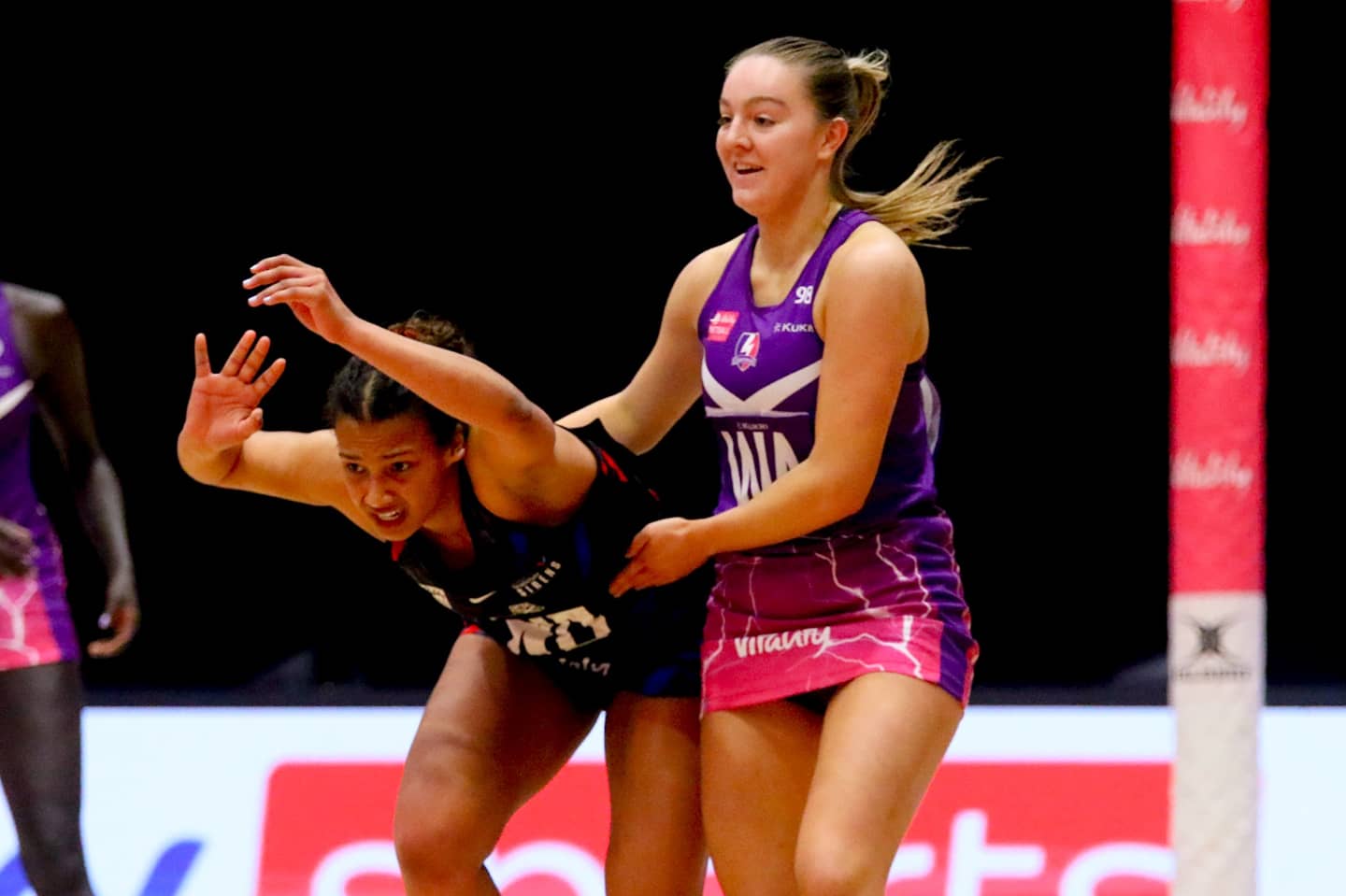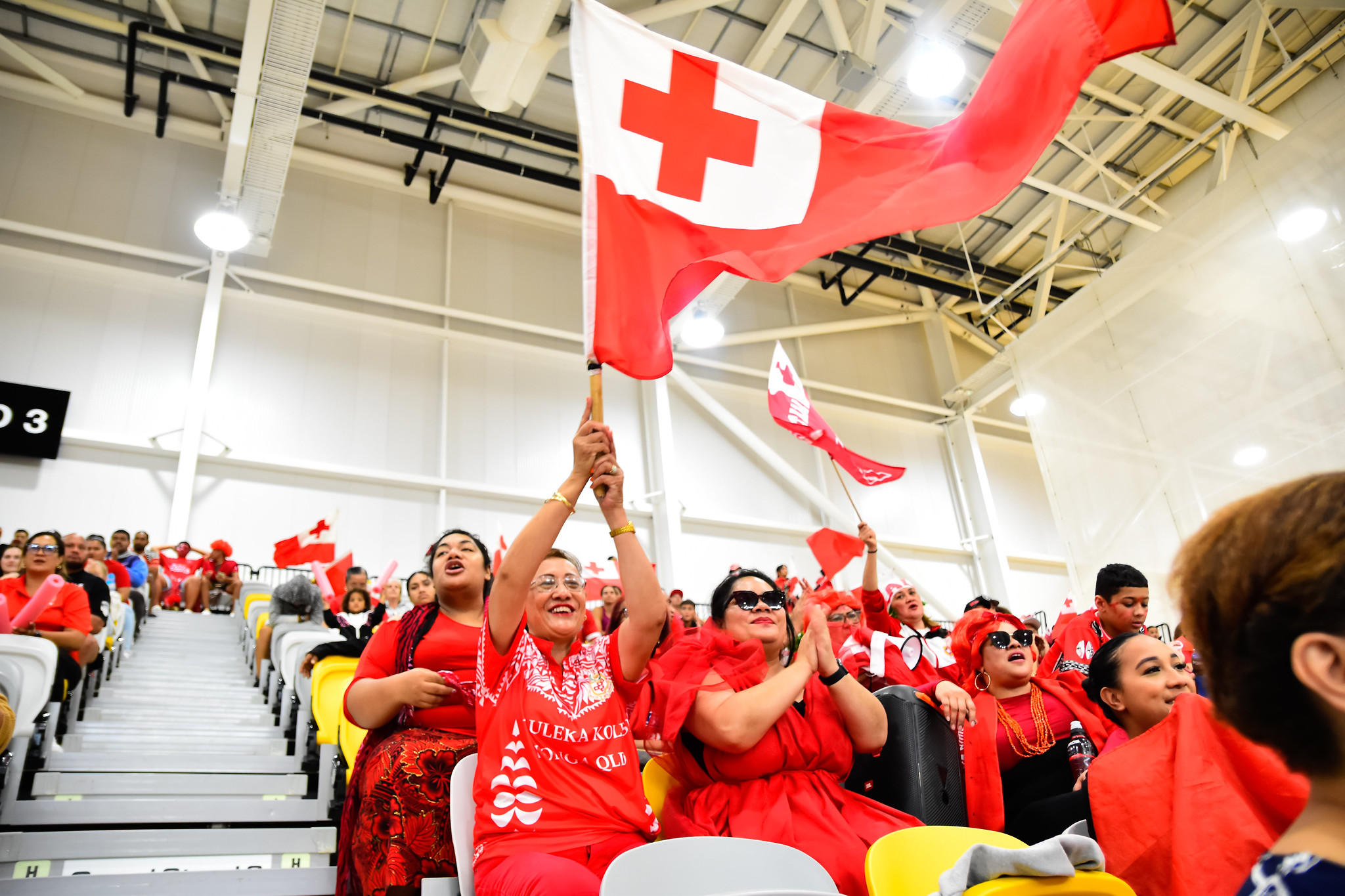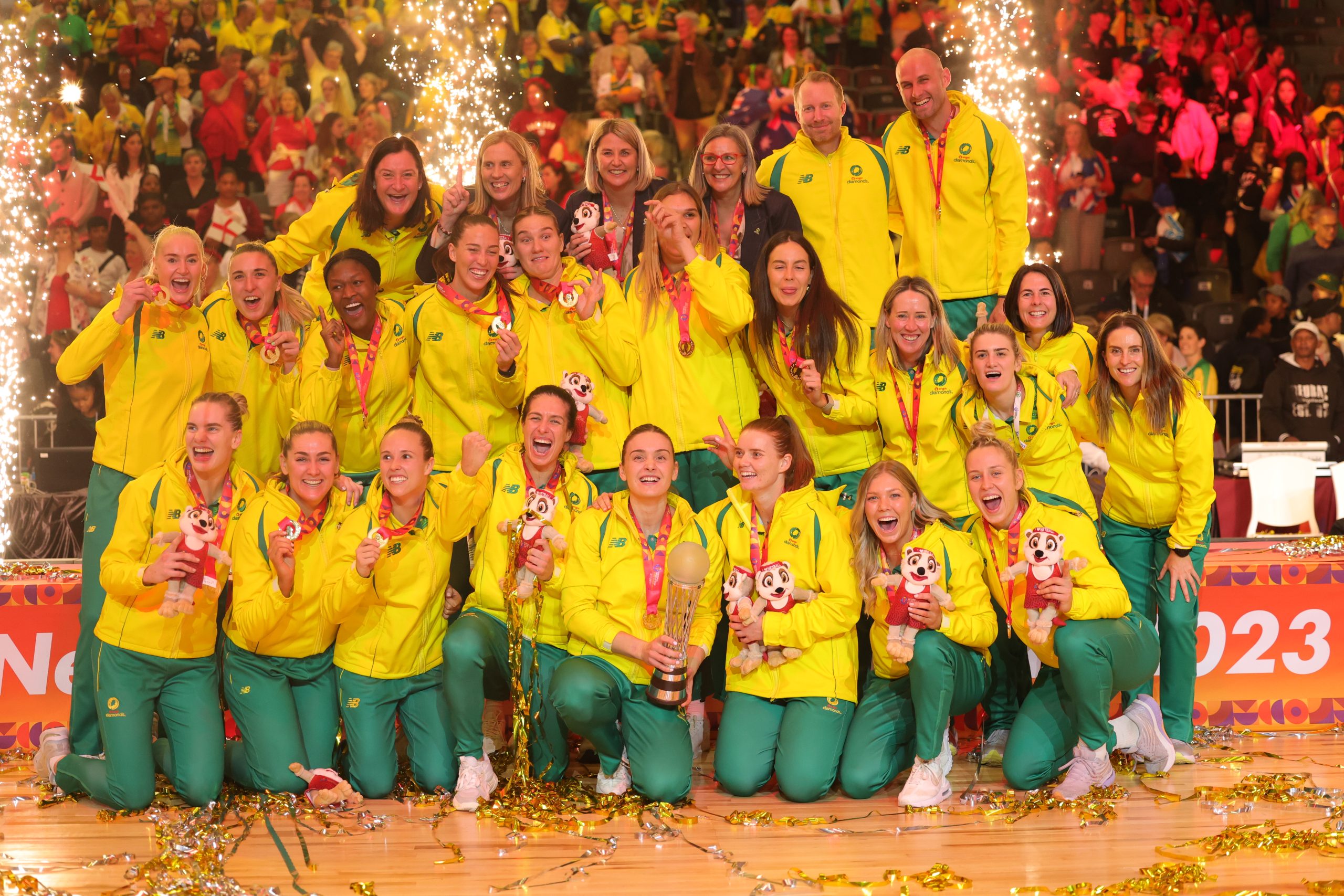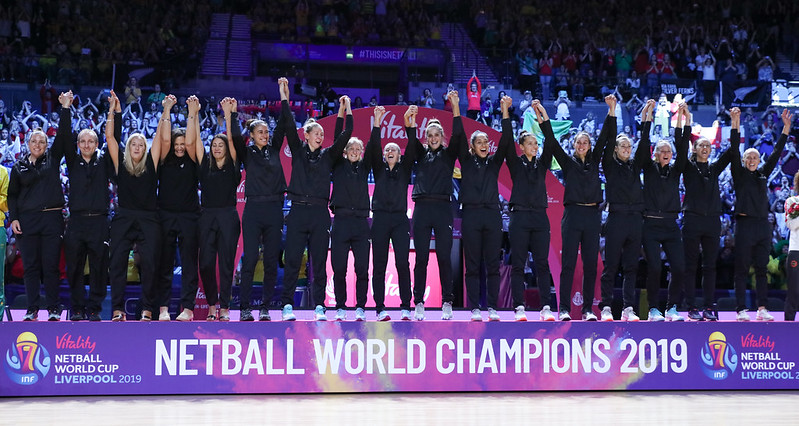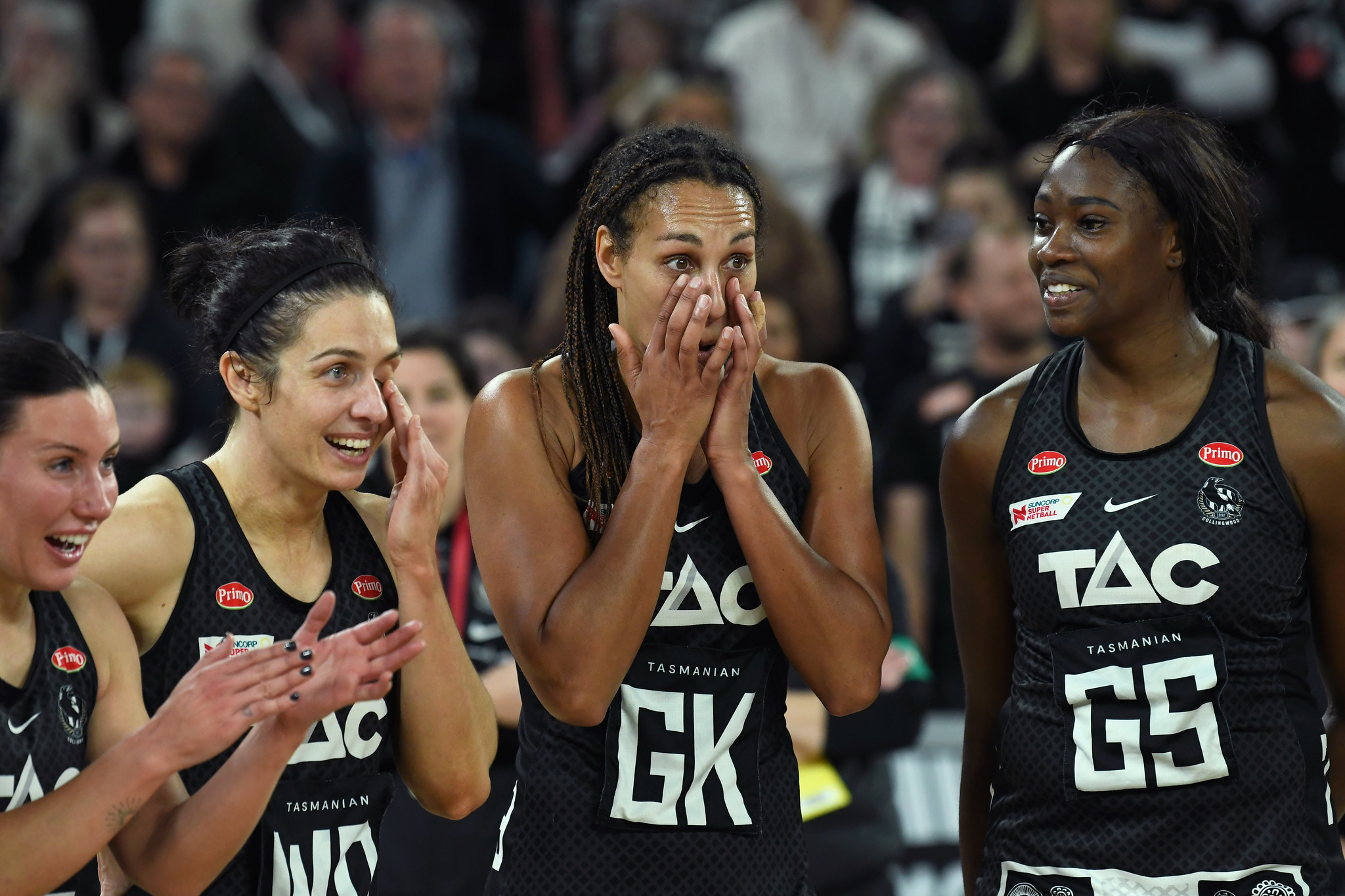Contributors – Zara Collings, Rona Hunnisett, Eve Cobbett and Ian Harkin
Defence is on top…
By Zara Collings
Round eight was the round for the defenders, with some incredible defensive performances across all six games of the round. A common conversation throughout the season has been how each team’s attacking units stand up to the dynamic, intuitive and man-on defensive pressure that teams are increasingly producing in 2021, and this week was no different. Our current top two of Bath and Loughborough Lightning continued to separate themselves from the rest of the league , with five points now separating Lightning and third placed Wasps, with both squads showing the grit and depth to cement their place within the top two.
Loughborough held on against a gritty Sirens side, who are so close to executing the full 48 minute game plan required to take a swipe at the top four. Captain Gia Abernethy challenged that Sirens are now one of the ‘big guns” and as the Scottish based side continue to build an impressive army to support their on-court performances, they can no longer be considered an underdog. However the injection of Jas Odeogberin at Goal Defence proved to be key for Lightning early on in the match, who brought additional fight to the Loughborough side, earning a well deserved Player of the Match award. Most importantly, the team’s defensive end stood up and delivered on a day when the franchise struggled in attack. Usually ever so reliable under the post, Goal Shooter Mary Cholhok had somewhat (for her lofty standards!) of an off day, shooting well below her season average at 33 goals and 73%. Whilst every player is entitled to an off-day and this is no way questioning of Cholhok’s ability, the fact that Lightning were able to pull through and win against a feisty and talented opposition on a day when they were off pace at one end of the court, shows that they are a cohesive unit that really do pull together as one team, something which stands them in greater stead in their finals quest.
Team Bath put out another comprehensive performance against London Pulse, demonstrating further depth in their squad when Hannah Passmore made her VNSL debut at Goal Shooter. Their ability to rotate players, largely seamlessly, into the on-court seven has been a key strength of Bath this season and will play a huge part in their finals campaign. Only time will tell which team will be able to break down the “Blue Brick Wall.” Whilst Bath’s defensive pressure has been solid, we are starting to see the chinks in their attacking armour, as discussed in Sky’s recent ‘Off the Court’ programme. To break down Team Bath, you have to isolate players and force them to work singularly, something which applies from Goal Shooter to Goal Keeper. Whilst this will certainly not be easy against a team as well drilled and team-oriented as Bath, teams must seek to break down this well-formed unit in order to halt Bath’s winning parade.
Despite not being able to secure any championship points in Round Eight, the London Pulse defensive unit again proved why they must be considered one of the toughest defensive ends in the league. The dynamism of Fumni Fadoju and Halimat Adio, combined with Zara Everitt’s ability to read play and take a well-timed interception is incredible for a starting defensive unit whose average age is just 21! Add the experience and game knowledge of Lindsay Keeble and you find a Pulse side who are turning over enough ball to challenge each and every top four side. Adio, Everitt and Fadoju are all currently linked to the England national set-up, either named in the Roses Futures programme or the Under 21 squad, and will only go from strength to strength with the consistent court time they are receiving at Pulse. With the leadership shown by Adio both on and off-court and the raw talent of Everitt and Fadoju, London Pulse are certainly providing England head coach Jess Thirlby with some outside the box options for any upcoming Roses tests.
Round nine is set to bring some truly epic clashes and will be a particularly tough week for Manchester Thunder, taking on both Saracens Mavericks and Loughborough Lightning who are currently sitting in coveted Top Four positions. This will be a huge test for the Northern side, who have struggled in recent games to put out a full four quarter performance – something which is essential to secure all six points. Nailing their centre court line-up will be key to Thunder’s success here, having started Round eight with young-gun Alissia Scholes at Wing Attack, before reverting to veteran Northern Ireland athlete Caroline O’Hanlon after just one quarter. Thunder must continue to build momentum, as a double win in Round nine could elevate them second position depending on winning margin. Winless Celtic Dragons will face Severn Stars, a team who have also struggled to get points on the board this season. Both Stars and Dragons come into this game after strong Round Eight performances and both will be targeting this as an important match-up.
As the mid-table remains crowded and gunning for the elusive wins to take them into a top four position, it is no longer a case of working out a starting seven and trying combinations on court. Every point matters, and with third to sixth position separated by a single point and goal difference, everything is very much still to play for.
Stats Leaders of the Week
Most Goals: 35 Ine-Marie Venter (Mavericks v Stars)
Most Gains: 10 Layla Guscoth (Bath v Pulse)
Most Offensive Rebounds: 4 Sienna Rushton (Pulse v Rhinos)
Most Defensive Rebounds: 3 Eboni Osoro-Brown (Bath v Pulse)
Most Intercepts: 7 Layla Guscoth (Bath v Pulse)

Funmi Fadoju was a star of Pulse’s defence against Rhinos. Photo: England Netball
RESULTS
MANCHESTER THUNDER 48 def LEEDS RHINOS 41
Thunder:
Mvula 29/32 (91%)
Cardwell 19/19 (100%)
TOTAL 48/51 (94%)
Gains 10 (Almond 4)
Rhinos:
Rushton 31/45 (69%)
Dixon 10/13 (77%)
TOTAL 41/58 (71%)
Gains 10 (Hollingworth, Kindred, Keenan 2)
Player of the Match: Laura Malcolm (Thunder)
Match Report – Thunder v Rhinos
By Rona Hunnisett
Bragging rights were at stake in the first ever meeting between the two northern-based franchises, with Thunder head coach Karen Greig hoping to outwit her former assistant Dan Ryan and push the reigning champions back up the table into the playoff spots. In an enthralling match for the neutral observer in which the lead changed hands several times, both sides showed moments of brilliance, but it was Thunder’s calmer heads and more accurate shooting that eventually secured the vital points. However, Greig will be under no illusions that her side had a lucky escape and will be faced with a sterner challenge on the return fixture in the coming weeks.
Who dominated?
Thunder’s shooters were simply unstoppable in this match, with the ability of both to go to post and net key goals at crucial moments creating a challenge which Rhinos were unable to counter. After a first half in which Mvula seemed to have the free run of the back space, leaving her clear under the post on numerous occasions, Ryan’s introduction of Tuane Keenan to contest the overhead pass looked to be a turning point, with the Malawi international restricted to a single goal in the third quarter. However, Leeds reckoned without the long range shooting and improved fitness of Ellie Cardwell. At goal attack for Thunder, the England international upped her work rate and netted a series of key long range goals to bring her side right back into the match, and push them ahead.
What worked?
When Leeds were confident and released their first time attacking the ball into space, their movement was simply too quick to counteract. Grierson and Dixon’s first time balls in to Rushton found the goal shooter in prime shooting positions. However, Thunder’s experienced heads soon adapted and started to swarm across the transverse line into the Rhinos attacking third. Too often, the Leeds side was forced into a cross court ball, which, if not picked off for an intercept, allowed the Manchester backline to regroup and close down the available space.
Where was it lost?
In a game of few turnovers, the team which stuck closest to the game plan was destined to come out on top. But in the heat of the moment, that can be hard to do. Leeds’ young front line was often guilty of impetuous passes, or missing simple goals, which allowed Thunder to regroup and grow in confidence. Undoubtedly, Leeds will definitely learn from this experience and come back stronger and more focused.
When was it won and lost?
Entering the final quarter level at 33 all, the contest was anyone’s for the taking, and after a third period in which she scored only a single goal, Joyce Mvula appeared to have been played out of the contest by Tuane Keenan. But drawing on her wealth of experience, Mvula adjusted her game plan, pulling out to the top of the circle to create space for Cardwell, or driving forwards to receive a flat feed. Rhinos defence failed to adapt and Thunder sensed victory as the scoreline widened in their favour.
How did she do that?
The rolling circle interplays between Rushton and Grierson at the start of the match often left Almond and Airey flat footed and grasping at shadows, but for sheer audacity, midway through the second quarter, it is hard to overlook one pinpoint feed from Northern Irish international Caroline O’Hanlon. With seemingly no opening to utilise, she somehow conjured up a pinpoint pass to Ellie Cardwell under the post, which the England international latched on to with cm to spare, and from which she scored a goal with almost her whole back to the post.
Starting lineups:
Thunder: GS Mvula, GA Cardwell, WA Scholes, C O’Hanlan, WD Malcolm, GD Airey, GK Almond
(Changes: During 1st Q – C Carter, O’Hanlan to WA. During 2nd Q – GD McCormick. During 3rd Q GD Airey)
Rhinos: GS Rushton, GA Dixon, WA Grierson, C Clarke, WD Hollingworth, GD Oyesola, GK Kindred
(Changes: During 2nd Q – WA Hall, GD Magee. 3rd Q – GK Keenan, Oyesola to GD)
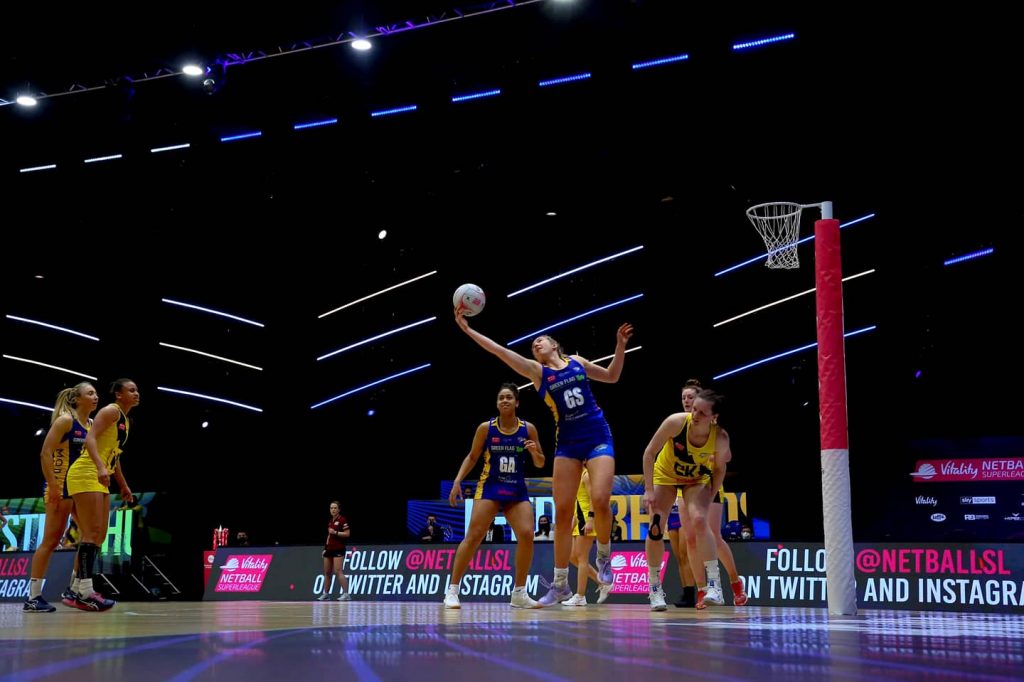
Rhinos’ goal shooter Sienna Rushton in action against Thunder. Photo: England Netball
TEAM BATH 51 def LONDON PULSE 29
Pulse:
Sigi Burger 18/20 (90%)
Lefebre Rademan 5/8 (63%)
Kira Rothwell 4/4 (100%)
Olivia Tchine 2/5 (40%)
TOTAL 29/37 (78%)
Gains 9 (Everitt, Adio, Keable 2)
Bath:
Kim Borger 20/20 (100%)
Sophie Drakeford-Lewis 13/13 (100%)
Betsy Creak 11/12 (92%)
Hannah Passmore 7/9 (78%)
TOTAL 51/54 (94%)
Gains 16 (Guscoth 10)
Player of the Match: Layla Guscoth (Bath)
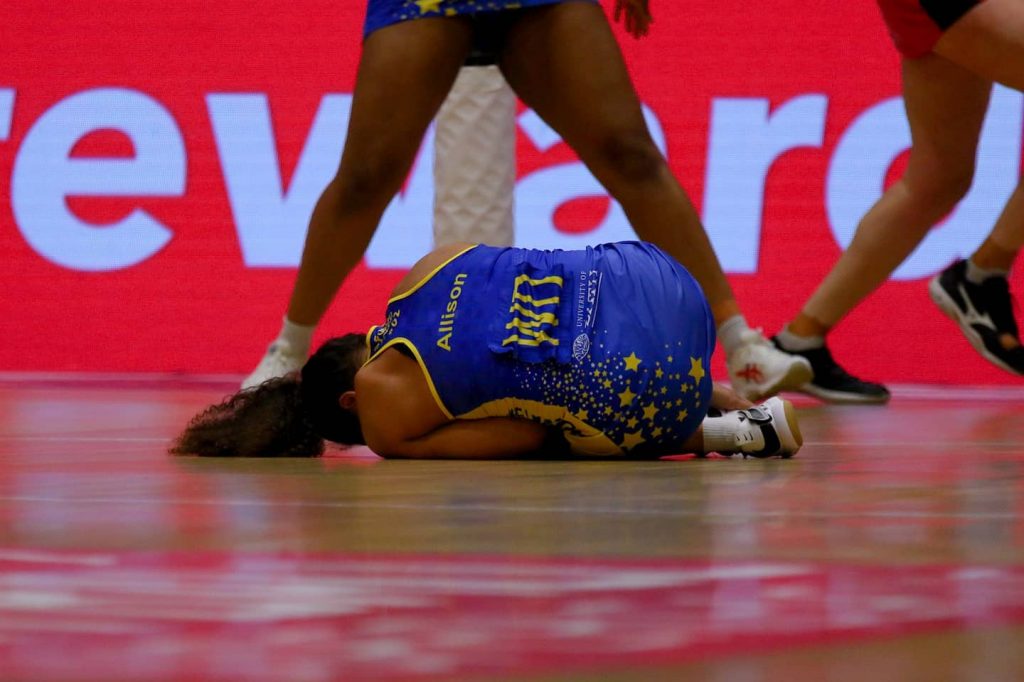
Bath’s wing defence Imogen Allison went down with injury against Pulse. Photo: England Netball
LOUGHBOROUGH LIGHTNING 43 def STRATHCLYDE SIRENS 38
Lightning:
Mary Cholhok 34/43 (79%)
Suzie Liverseidge 9/12 (75%)
TOTAL 43/55 (78%)
Gains 17 (Harvey 8)
Sirens:
Emma Barrie 23/31 (74%)
Bethan Goodwin 4/7 (57%)
Niamh McCall 11/13 (84%)
TOTAL 38/51 (74%)
Gains 12 (Nicholl 5)
Player of the Match – Jas Odeogberin (Lightning)
Match report – Lightning v Sirens
By Eve Cobbett
Game 3 of Round 8 saw Loughborough Lightning take on Strathclyde Sirens. This game was tipped to be a blow out on social media, with many predicting Lightning would win big. It ended, however, with Sirens launching a campaign claiming VNSL viewers should no longer be surprised by Sirens’ performances against the ‘big guns’, but instead should understand that Sirens are the ‘big guns’. That said, Sirens once again fell short in Round 8, suffering their 4th loss of the season and handing Lightning their 7th win.
Who dominated?
That said, this game was an even affair up until half-time. After 24 minutes the score was tied 19-19 with little separating each team. The difference, however, was Lightning’s renewed intensity and purpose coming out after the break. Although Sirens stayed in touching distance, each Lightning player came out more focused in the second-half. This full-squad intensity was the key to Lightning eventually taking control. In particular, Jas Odeogberin – eventual player of the match – Beth Cobden and Alice Harvey dominated for Lightning, picking up 6 deflections and 4 interceptions between them in the second half, compared to 4 and 2 in the first.
What worked?
What worked, and continues to work each round for Sirens, was their full-court attack. Emily Nicholl and Taylor Cullen do a wealth of work off defensive backlines and after interceptions, with their ball speed and movement continually impressing. They seem well-drilled and aware of their role, which suggests their coaching team is giving them clear instructions which they are able to implement seamlessly.
Although this was lacking in the first half, Lightning looked most impressive in this match when Suzie Liverseidge injected herself into the game and took control out the front of the goal-circle, using her speed to present herself as a viable option for Lightning’s feeders. This distracted and separated Towera Vinkhumbo and Nicholl, allowing Hannah Joseph, Nat Panagarry and Hannah Williams the option to either pass front to Liverseidge or go over the top to Mary Cholhok.
What needs improvement?
Despite there being good patches of play for both sides in this game, there is also much to improve on. In particular, Sirens’ shooting end had many of the same issues as in Round 7. Whilst Emma Barrie is tall with an impressive hold, she arguably lacks a second option when her hold fails. When Odeogberin and Harvey picked up the intensity of their play in the second half and began moving more, Barrie was soon unable to set up a hold against them. Faced with having no other game plan, she was forced to take shots from outside her comfortable range or was simply not an option for her feeders. This translated into her making only 4 attempts on goal during the entire 3rd quarter. For Sirens to improve, they need to have multiple game plans to switch to when they become stuck.
Sirens also need to work on their composure under pressure. With only a few minutes to go in the final quarter Gia Abernethy forced a ball into Barrie, who fell off the backline trying to collect. This was undoubtedly a turning point as Sirens needed to take the ball to goal in order to remain within touching distance of Lightning. Sirens must begin to eliminate these errors from their play if they are to start converting close matches into wins. That being said, it was evident how furious Abernethy was with herself for giving away the ball cheaply, and this speaks volumes of Sirens as a team. Each player is clearly willing to hold themself accountable for their mistakes and this will undoubtedly lead to improvement.
For Lightning, improvement must come in their purpose and control in their attacking end. Too many balls were thrown off the backline in this game, especially in quarter 1 and 2. Standing at 2.01m it is obviously fine, if not preferable, for Lightning to throw high balls into Cholhok. However too many of the passes to Cholhok in this game were thrown too early with not enough control. If Lightning wish to compete with the likes of Bath further down the line, they must start feeding their shooters more precisely.
Where was it lost?
Unfortunately, this game was lost for Sirens in their shooting end. They had 51 attempts, only converting 38 of those. This left them at a disappointing 74% shooting accuracy overall, with Bethan Goodwin and Barrie sitting at just 57% and 74% respectively. Missing shots is not necessarily an issue in itself, with Sienna Rushton proving for Rhinos earlier in the round that as long as missed shots were followed by rebounds, teams could stay within reach. This was not necessarily happening for Sirens’ shooters however, with each missing too many shots and failing to pull in their rebounds.
When was it won?
Much has been made of the 3rd quarter, or the ‘championship quarter’, being the key to winning games, and this certainly proved true for Lightning. Loughborough won this game by coming into the second half with renewed intensity. Panagarry and Cobden’s restored sense of purpose meant that the pair rode Beth Dix and Abernethy for the full quarter. This in turn led to the Sirens’ midcourters fading away and becoming confused on the circle edge. The third quarter also saw the Lightning defence come alive – Harvey picked up 2 deflections, with Cobden recording 1. The two Lightning defenders also picked up an interception each in the penultimate quarter. In contrast, quarter 3 saw the Sirens’ defenders quieted, with Nicholl being the only defender to register an interception or deflection in this quarter. This, coupled with 100% shooting accuracy from Liverseidge in quarter 3 and Cholhok shooting her highest number of attempts (12), sealed the win for Lightning.
How did she do that?
There was no real ‘how did she do that?’ moment in this match, however one of the most intriguing points of the game was when umpire Chris Obin stopped time to ask Lightning captain Panagarry to gather her teammates to tell them to stop the dissent and back-chat. To viewers at home this was an unexpected move by the umpire and perhaps demonstrates one of the unforeseen consequences of having no crowds up in Wakefield – the umpires are now able to hear every word said on court.
Starting Lineups:
Lightning: GS Cholhok, GA Liverseidge, WA Joseph, C Panagarry, WD Cobden, GD May, GK Harvey
Sirens: GS Barrie, GA Goodwin, WA Dix, C Abernethy, WD Cullen, GD Nicholl, GK Vinkhumbo
Umpires: Allison Harrison and Chris Obin
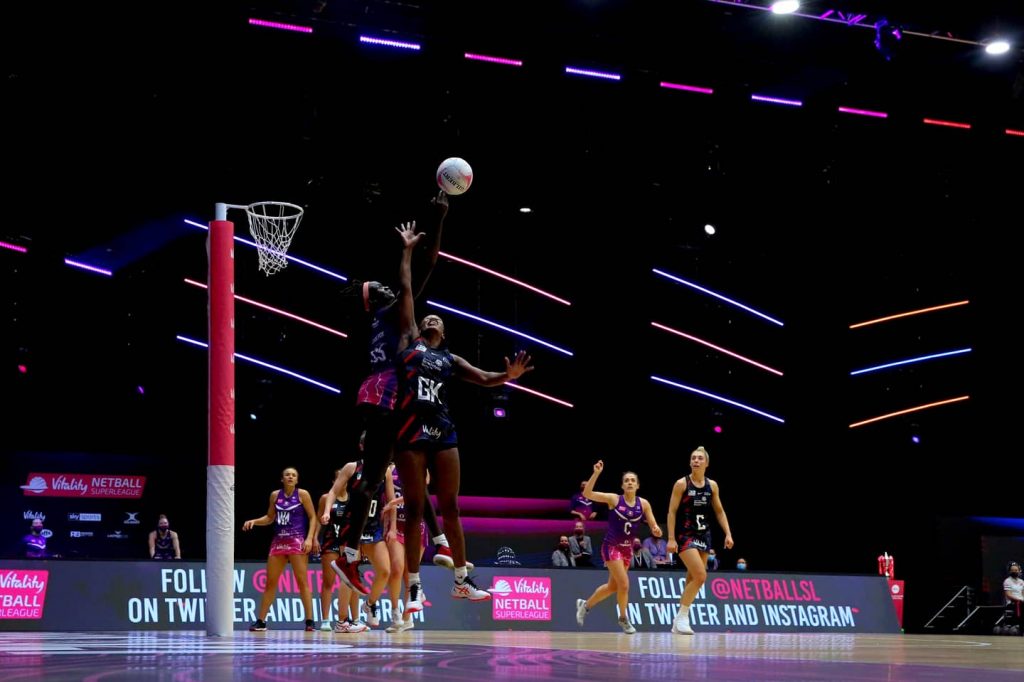
Lightning’s Mary Cholhok and Sirens’ Towera Vinkhumbo battle for the ball. Photo: England Netball
WASPS 52 def CELTIC DRAGONS 38
Wasps:
Rachel Dunn 33/36 (92%)
Katie Harris 13/14 (93%)
Gazelle Allison 6/8 (75%)
TOTAL 52/58 (90%)
Gains 13 (Huckle 5)
Dragons:
Amy Clinton 21/30 (70%)
Rebekah Robinson 17/23 (74%)
TOTAL 38/53 (72%)
Gains 8 (Jones 4)
Player of the Match: Amy Flanagan (Wasps)
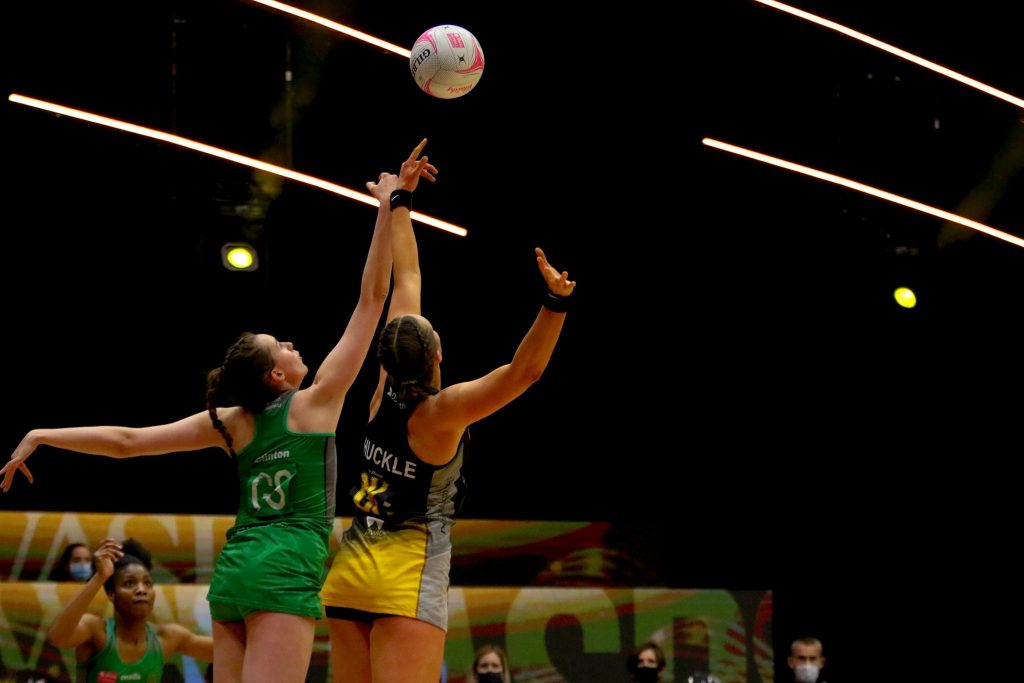
Wasps’ Josie Huckle and Dragons’ Amy Clinton fight for possession. Photo: England Netball
SARACENS MAVERICKS 53 def SEVERN STARS 36
Mavericks:
Ine-Mari Venter 35/41 (85%)
Kadeen Corbin 18/24 (75%)
TOTAL 53/65 (82%)
Gains 11 (Quashie 7)
Stars:
Georgia Rowe 14/15 (93%)
Paige Reed 22/26 (84%)
TOTAL 36/41 (88%)
Gains 7 (Jones, Bolakoro, Herdman 2)
Player of the Match – Razia Quashie (Mavericks)
Match Report – Mavericks v Stars
By Eve Cobbett
The penultimate game of Round 8 saw Saracens Mavericks take on Severn Stars, with Mavericks coming away with a fairly convincing 53-36 win. Both teams were coming into this game off the back of close contests in Round 7, so were looking to clean up their error rates and put out a complete performance.
Who dominated?
As always, Razia Quashie dominated for Mavericks. She built through the game, ending with 6 interceptions and 4 deflections to her name. More importantly, she was disciplined and tidy in her play, something Mavericks were missing as a team. Being the only Mavericks player not to pick up an unforced error in the first quarter, Quashie proved herself to be a reliable, disciplined player who leads by example each round.
Ine-Mari Venter also stood out in this game, showing why she has two different SSN teams on her resume. For much of this game Venter was Mavericks’ only option, holding strong in the circle when they lacked options out the front. She also proved her shooting can remain consistent across the full 48 minutes, shooting at a respectable 85%.
What worked?
Both teams were at their best in this game when their wing-attacks and goal-attacks utilised their speed. Both Beth Dyke and Sasha Corbin are every wing defence’s nightmare, with speed to burn and impressive changes of direction. At times we saw their brilliance in this game, Dyke in particular impressing when she used her speed to draw her defender and then pull out and into the back space. This wasn’t always on show in this match though, Dyke often being held up by Jodie Gibson and Gabby Marshall. The same could be said of Corbin, who was often missing from this match. That said, there were some exceptional examples of her ability to drive to the top of the circle in this match. Something Mavericks will want to see more of going forward.
What needs improvement?
‘Unforced errors’ were the words on everybody’s lips watching this game, both teams making far too many mistakes. Making unforced errors is an issue that has plagued Mavericks so far this season, with this game no different. They had 8 unforced errors in the first quarter, including 2 footwork calls and 3 for breaking (with the 3rd leading to a caution for Corbin). What set the two teams apart, however, was the way Mavericks cleaned up their errors after quarter 1. Whilst Stars continued to make errors throughout the game, Mavs had very few after the first 12 minutes. Despite any improvements, both teams will be unhappy with their scrappy play and look to clean this up going into Round 9.
When was it won?
Despite a scrappy start, Mavericks prevailed by shutting down Stars in the midcourt, with their defenders turning that pressure into turnovers. Mavericks were also better than Stars at transitioning through to goal. Whilst Mavericks had 65 shooting attempts, converting 58 of those, Stars ended the game on only 41 attempts. What’s more, Paige Reed out at goal attack actually had a higher shooting volume than goal shooter Georgia Rowe. This demonstrates the pressure Quashie was putting on Rowe, stopping her getting into shooting position. It also shows the doubt Quashie put into the Stars’ feeders minds, shutting down all balls through to Rowe.
How did she do that?
The ‘how did she do that?’ moment of this game belongs wholly to Kadeen Corbin. After losing the ball in Quarter 2, Kadeen Corbin came for a flying intercept at the top of the goal circle, dispossessing Bolakoro, only then to go and attempt a lay-up. This play encompassed Corbin’s defensive capabilities, tenacity and flair all at once.
Starting Lineups
Mavericks: GS Venter, GA K. Corbin, WA S. Corbin, C Marshall, WD Gibson, GD Tripp, GK Quashie.
Stars: GS Rowe, GA Reed, WA Dyke, C Harris, WD Jones, GD Bolakoro, GK Herdman
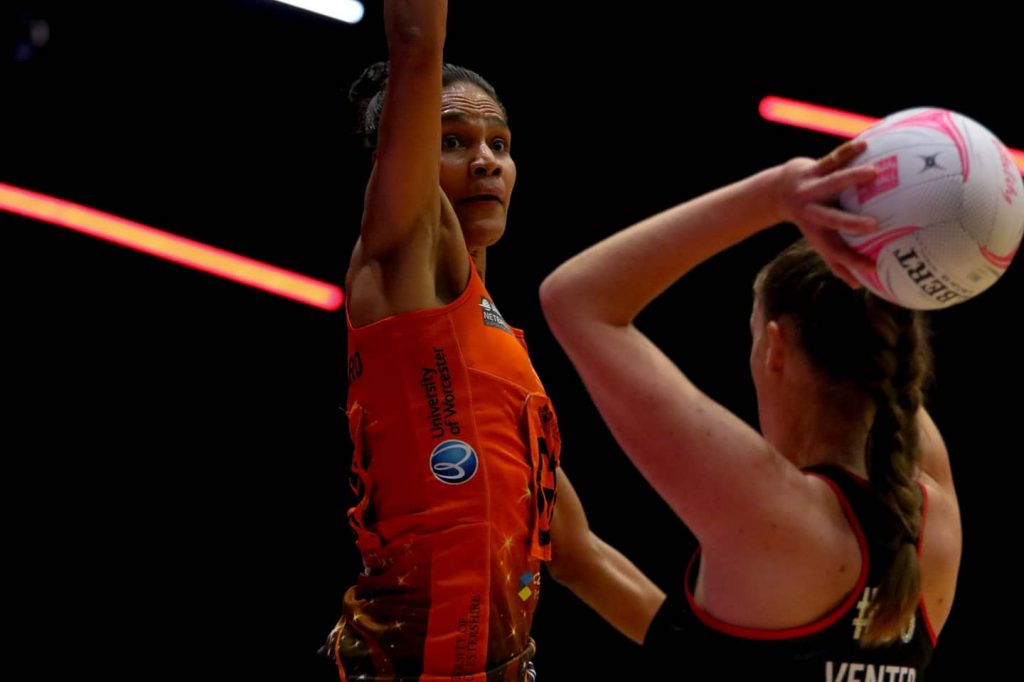
Mavericks’ Ine-Mari Venter prepares to shoot despite the efforts of Stars’ Adi Bolakoro. Photo: England Netball
LEEDS RHINOS 40 def LONDON PULSE 38
Pulse:
Sigi Burger 32/34 (94%)
Kira Rothwell 6/11 (55%)
TOTAL 38/45 (84%)
Gains 14 (Fadoju 7)
Rhinos:
Sienna Rushton 26/35 (74%)
Rhea Dixon 14/17 (825)
TOTAL 40/52 (77%)
Gains 10 (Dixon, Hollingworth, Oyesola 2)
Player of the Match: Funmi Fadoju (Pulse)
Match report – Pulse v Rhinos
By Ian Harkin
This was a match up of two teams coming off very contrasting defeats the previous day. Pulse was soundly beaten by ladder-leaders Team Bath, while Rhinos were more than competitive with Manchester Thunder, only letting the game slip away in the final minutes. But anyone expecting Rhinos to take this out comfortably was very much mistaken. Pulse gave them all they could handle in a seesawing encounter. The London side started quickly, surging to a 15-9 quarter-time lead, before Rhinos slowly but surely reeled them in and went on to win 40-38, thus notching their fifth win of the season in the process. Pulse remains with just the solitary win, but a performance like this suggests their second may not be too far away.
Who dominated?
In what was a hectic and frantic game at times, calmness and experience was needed, and who better to provide that than the most experienced player on court. Captain Jade Clarke was everywhere once again for Rhinos, providing a terrific link between attack and defence, and regularly creating and capitalising on chances. She was absolutely vital in this game, and often it’s the “one-percenters”, the little things she does that may go unnoticed, that end up being the difference.
With a combination of outstanding athleticism, reflexes and timing, Funmi Fadoju starred for Pulse both at wing defence and then goal defence. She is seemingly able to get a touch to balls that others can’t. Not only does this result in multiple intercepts and deflections, but importantly, it plants seeds of doubt in opponents’ minds. On occasions in this game, Rhinos players were seemingly open, but the passers were hesitant and looking elsewhere, simply because of the presence of Fadoju.
Despite currently being managed and therefore not playing full games, Vicki Oyesola makes a difference whenever she is on court. With her bustling, energetic defence, she makes herself a real pest (in a good way). With the score at 36-33 to Rhinos halfway through the last quarter, Pulse forced a turnover through (you guessed it) Fadoju. If they could convert, it would give them a chance to narrow the gap to just one. But it was Oyesola who came from behind Sigi Burger to intercept the feed in the circle. Rhinos scored from that possession and the balance was restored.
What worked and what still needs improvement?
Both teams’ shooting combinations are a work in progress. Forced into the role of number one goal shooter through the absence of Donnell Wallam, 18-year-old Sienna Rushton has done a terrific job for Rhinos. Although shaky on the shot on several occasions, her strength and positioning have been first class. Creative goal attack Rhea Dixon has been a revelation, and gets better each game, but at times she is reluctant to shoot, which causes problems in the circle.
She hasn’t had the greatest start to her Superleague season, but Pulse’s Burger showed what she can do in this game, shooting 32/34 and generally providing a much better target up front. Her combination with the promising Kira Rothwell is still evolving, and is sure to improve as the season goes on.
Both teams worked well in defence in this game. As well as Fadoju, Pulse also had Zara Everitt and Halimat Adio causing all sorts of problems, while Oyesola, Paige Kindred and Emily Hollingworth combined well for Rhinos.
Where was it won and lost?
With a margin of just two goals separating the teams, it’s difficult to say that any one area proved a huge advantage. But one factor was experience. Pulse is the youngest team in the competition. Once Rhinos gained some sort of ascendancy in the third quarter, experience in decision making, certainly played a part in keeping them there.
When was it won and lost?
In a tense final quarter, there were several twists and turns. Rhinos held the lead throughout, but Pulse were pushing hard, looking for any opportunity to eat into the margin. With less than three minutes on the clock, Pulse were down by four, but on attack. Thanks to some tremendous defensive work by the Rhinos back four, Pulse wing attack Lefebre Rademan was left unable to find an open teammate in time and held ball was called. Rhinos then patiently went down court, eventually finding Dixon who calmly landed the goal to make the score 40-35 in Rhinos’ favour. Despite a frenetic finish from Pulse, that five goal margin was too great to peg back in the time remaining.
How did she do that?
Funmi Fadoju actually provided not just one, but a handful of these moments in this game! She regularly pounced on balls that looked totally out of reach, tallying up four intercepts and 13 deflections. It seems that in years to come we won’t be saying “how did she do that” but rather “she’s done it again!”
Starting Lineups:
Pulse: GS Burger, GA Rothwell, WA Dekker, C Ratu, WD Fadoju, GD Everitt, GK Adio
Rhinos: GS Rushton, GA Dixon, WA Grierson, C Clarke, WD Hollingworth, GD Oyesola, GK Kindred

Rhinos’ Sienna Rushton calls for the ball against Pulse’s Zara Everitt. Photo: England Netball
Catch up on the latest VNSL news, and hear from the people involved thanks to our friends at The Netball Show
LADDER
(after Round 7)
Team/Played/Points/Goal diff.
BATH . 8 . 24pts . +138
LIGHTNING . 8 . 21pts . +115
WASPS . 8 . 16pts . +62
MAVERICKS . 7 . 16pts . +37
—
THUNDER . 67. 15pts . +79
RHINOS . 9 . 15pts . -3
SIRENS . 9 . 11pts . -12
STORM . 8 . 6pts . -58
—
PULSE . 6 . 3pts . -50
STARS . 7 . 3pts . -123
DRAGONS . 7 . 0pts . -192
INJURIES
Ongoing injuries/unavailability:
Imogen Allison, Team Bath – Injured ankle/achilles in Q1 v London Pulse and did not return to court
Emma Dovey, Manchester Thunder – unavailable for Manchester Thunder v Leeds Rhinos due to injury, awaiting scan results with up to four weeks out.
Berri Neil, Manchester Thunder – unavailable for Manchester Thunder v Leeds Rhinos due to non-covid related illness
Adean Thomas, London Pulse – unavailable for Pulse v Bath due to an ongoing injury
Lynsey Gallagher Strathclyde Sirens– undergoing surgery for her lateral meniscus and hopes to return before the end of the season
Donnell Wallam, Leeds Rhinos – fractured radius bone, hoping to return in a few weeks
Fi Toner, Leeds Rhinos – achilles injury out for a number of weeks
COMING UP
Round 9
Sunday 4th April
12 noon Manchester Thunder v Loughborough Lightning
2pm Severn Stars v Celtic Dragons
4pm London Pulse v Wasps
6pm Saracens Mavericks v Team Bath
Monday 5th April
5.15pm Severn Stars v London Pulse
7.15pm Saracens Mavericks v Manchester Thunder

